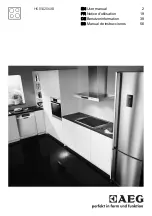
12.4. ENAMELLED PRODUCTS
For the cleaning of enamelled surfaces use soap water or not aggressive and not chemically abrasive detergents.
After the cleaning do NOT let soapy water or any cleanser dry but remove them immediately.
12.5. CHROMIUM-COMPONENTS
If the components become bluish due to overheating, this can be solved with a suitable product for cleaning. DO NOT use abrasives or
solvents.
12.6. CAST IRON TOP and the HOT PLATES
The cast iron top (cookers) and the hot plates (cookers - stoves) should be periodically sanded with 150 grit sandpaper.
NO enamelled
surfaces
.
12.7. GLASS CLEANING
Thanks to a specific inlet of secondary air, the accumulation of dirty sediments on the glass-door is reduced with efficacy. Nevertheless this
can never be avoided by using solid fuels ( particularly wet wood ) and it has not to be understood as a defect of the appliance.
IMPORTANT: The cleaning of the sight glass must be carried out only and exclusively with cold device to avoid the explosion of
the same.
For the cleaning, it is possible to use specific products or a wet newspaper paper ball passed in the ash to rub it.
Do not
use cloths, abrasive or chemically aggressive products by cleaning the hearth glass
.
The correct lighting phase, the use of proper quantities and types of fuels, the correct position of the secondary air regulator, enough
draught of the chimney-flue and the presence of combustion air are the essential elements for the optimal functioning of the appliance and
for the cleaning of the glass.
BREAK OF GLASSES: Given that the glass-ceramic glasses resist up to a heat shock of 750°C, they are not subject to thermal
shocks. Their break can be caused only by mechanic shocks (bumps or violent closure of the door, etc.). Therefore, their
replacement is not included in the warranty
.
12.8. CLEANING OUT THE ASHES
All the devices are equipped with a hearth grating and an ash drawer for the collection of the ashes.
It is suggested to empty periodically the ash drawer and to avoid it fills completely in order not to overheat the grating. Moreover, it is
suggested to leave always 3-4 cm of ash in the hearth.
CAUTION
:
The ashes removed from the hearth have to be stored in a container made of fire-resistant material equipped with an
air-tight cover. The container has to be placed on a fire-resistant floor, far from flammable materials up to the switching off
and complete cooling.
12.9. CLEANING THE FLUE
The correct lighting phase, the use of proper quantities and types of fuels, the correct position of the secondary air regulator, enough
draught of the chimney-flue and the presence of combustion air are the essential elements for the optimal functioning of the appliance.
The device should be completely cleaned at least once a year or every time it is needed (in case of bad working and low yield). An
excessive deposit of soot can cause problems in the discharge of smokes and fire in the flue.
The cleaning must be carried out exclusively with cold equipment.
This operation should be carried out by a chimney sweeper who
can simultaneously perform an audit of the flue (checking of possible deposits).
12.10. CLEANING OF THE TermoCOOKING COLLECTION CASING with under door oven
The smokes collection casing can be cleaned either through the door which is under the oven (
) or from the top.
It will be necessary to carefully clean the exchange surfaces removing the movable part of the hob and scraping the exchange surfaces of
the furnace and the pipes which compose the tube bundle located above the oven, as well as the downward passage of the smoke on the
right side of the oven. Later clean the smoke passage under the oven. Cleaning can be made with a brush and a vacuum cleaner.
Pay ATTENTION that after cleaning all dismounted parts are reinstalled hermetically
.
12.11. LATERAL HANDRAIL
The handles, the handrail and the tank water (cookers) should be cleaned to cold with a soft cloth and alcohol . DO NOT use abrasives
or solvents.
12.12. CLEANING OF THE HEARTH GRATE
IMPORTANT
: if for whatever reason the grill is removed from the furnace, take care to reassemble it with the wider part of the slit facing
). This is to aid furnace cleaning.
12.13. MAINTENANCE ON THE WATER SYSTEM
Excessive incrustation deposits on the inner walls of the hearth considerably reduce the efficiency of heat exchange; therefore, remove
these deposits using a steel brush whenever necessary.
Never use corrosive substances that can damage the thermo-fireplace and
the boiler.
With the system switched off, once a year carry out the following checks:
• Check the operation and efficiency of the blowdown and safety valves. If they are defective, contact your authorised installer.
IT IS
STRICTLY FORBIDDEN TO REMOVE OR TAMPER WITH THE SAFETY DEVICES.
• Check the thermal insulation of the filling pipe and the safety pipe.
• Make sure that the system is filled and under pressure, checking the water level in the expansion tank; also check that it is working
properly and check the efficiency of the safety pipe.
TERMOSUPREMA COMPACT DSA / ITALY TERMO DSA
27
















































